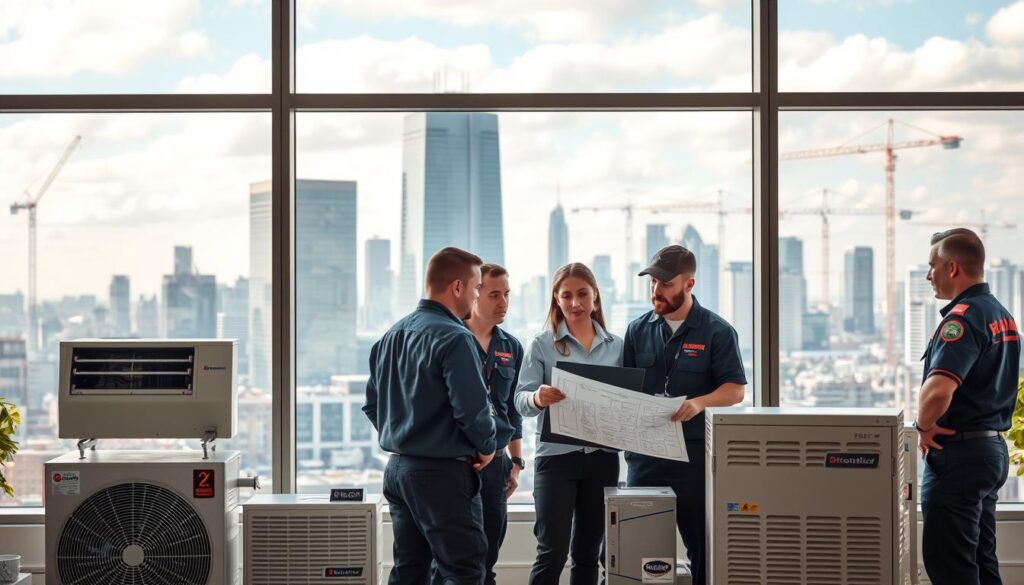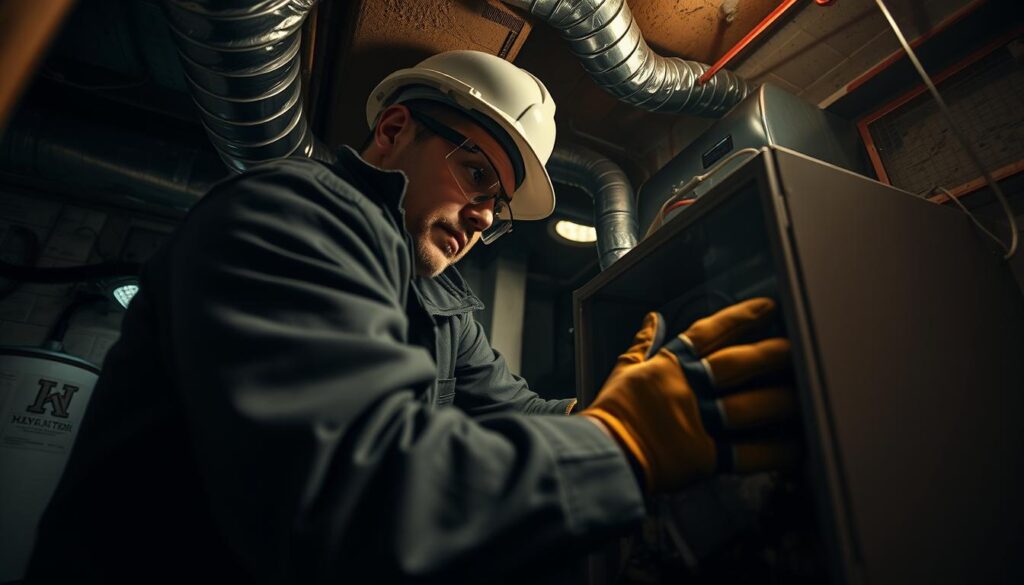Affiliate Disclosure
HVAC Guide Guys is a participant in the Amazon Services LLC Associates Program, an affiliate advertising program designed to provide a means for sites to earn advertising fees by advertising and linking to Amazon.
Is a Career in HVAC Worth It? Thinking about an HVAC career? It’s more than just a job. It’s a chance for a stable and rewarding future. The HVAC industry is dynamic, with lots of opportunities for those who invest in their skills.

HVAC technicians are in high demand. This is because buildings are getting more complex and energy efficiency matters a lot. If you’re interested, understanding the industry’s landscape and opportunities is key.
This guide will help you decide if an HVAC career is right for you. We’ll cover job prospects, salary, education, and career growth. Whether you’re just starting or looking to change careers, HVAC has never been more promising.
Key Takeaways
- HVAC offers stable career opportunities with strong job market demand
- Competitive salaries and the chance for career advancement
- Minimal educational barriers to entry
- Hands-on work with ongoing learning opportunities
- Growing industry driven by technological innovations
Table of Contents
Understanding the HVAC Industry and Career Path
The HVAC industry is a key part of today’s workforce. It’s growing as technology gets better. This makes it a great choice for those looking for a stable job.
HVAC workers keep places comfortable and safe. They work in many places. The industry is growing, with lots of chances for skilled people.
What HVAC Technicians Do
HVAC technicians install, fix, and keep systems running. They do many things every day. This includes:
- Figuring out why systems don’t work right
- Putting in new HVAC systems
- Doing regular checks
- Fixing electrical and mechanical parts
- Making sure systems use less energy
Industry Overview and Market Size
The HVAC field is getting bigger. Over 650,000 people work in it in the U.S. It’s growing because of:
- More people wanting energy-saving systems
- New technology
- More buildings being built
- Old systems needing to be replaced
Types of HVAC Work Settings
HVAC workers can find jobs in many places. This includes:
- Residential settings: Working on homes
- Commercial spaces: Offices, stores, restaurants
- Industrial facilities: Factories, warehouses
- Specialized sectors: Hospitals, schools, government buildings
“The HVAC industry offers unique opportunities for technical professionals who enjoy hands-on work and problem-solving.” – Industry Expert
Explore Our HVAC Shop
Looking for top-rated HVAC tools, parts, and accessories? Visit our shop and find the perfect solution for your needs.
Visit the ShopHVAC Career Outlook and Job Security
The HVAC industry is booming, with lots of opportunities for those looking for stable jobs. Your chances of finding a good HVAC job are high, thanks to the Bureau of Labor Statistics’ positive outlook.
Several factors are boosting HVAC career prospects:
- More people want energy-saving heating and cooling systems.
- New climate control technologies are coming out fast.
- There’s a big push for green buildings.
- Old buildings need a lot of upkeep and replacement.
HVAC techs are getting more important in homes, offices, and factories. The field is expected to grow by about 5% each year. This means lots of new jobs will open up all over the country.
| Industry Segment | Projected Job Growth | Average Annual Openings |
|---|---|---|
| Residential HVAC | 4.5% | 15,000 |
| Commercial HVAC | 6.2% | 22,000 |
| Industrial HVAC | 5.8% | 10,500 |
As buildings get more complex and energy rules get stricter, your HVAC skills will be in high demand. Keep learning and stay current with new tech to reach your full career goals in this fast-changing field.
Is a Career in HVAC Worth It: Analyzing the Benefits
Looking into a career in HVAC shows it’s a great choice. It offers growth and good pay without needing a four-year degree. The HVAC field is stable and rewarding for those who want a solid career.
Financial Rewards and Earning Earning Potential
One big reason to consider HVAC is the salary. HVAC techs can make a lot of money as they gain experience:
- Starting jobs pay around $49,500 a year
- Those with more experience can earn over $100,000 annually
- Technicians working with complex systems can earn even more
Job Stability and Growth Opportunities
But it’s not just about the money. HVAC jobs are also very secure. This is because buildings always need to be heated, cooled, and ventilated. This means there’s always work available in homes, offices, and factories.
Career Advancement Paths
Your HVAC career can grow in many ways:
- Focus on certain technologies
- Take on technical management roles
- Start your own HVAC company
- Work as an industry consultant
The HVAC industry offers a strong career path with ongoing learning and growth chances.
Explore Our HVAC Shop
Looking for top-rated HVAC tools, parts, and accessories? Visit our shop and find the perfect solution for your needs.
Visit the ShopHVAC Salary Potencial Across Different Experience Levels
Your HVAC career has great promise when you know the salary at each stage. Starting out, you’ll earn good entry-level pay. This pay grows as you gain experience and skills.
Here’s how salaries change at different career points:
- Entry-Level (0-2 years): Typically range from $35,000 to $45,000 annually
- Mid-Career (3-5 years): Salaries increase to $50,000 – $65,000
- Experienced Professionals (6-10 years): Can earn between $65,000 – $85,000
- Expert Level (10+ years): Possible to reach $90,000 – $120,000
What affects your earnings includes:
- Where you live
- Specialized certifications
- Employer type (residential vs. commercial)
- More technical skills
| Experience Level | Average Annual Salary | Potential Growth |
|---|---|---|
| Apprentice | $35,000 – $45,000 | Initial learning phase |
| Certified Technician | $50,000 – $65,000 | Steady skill development |
| Senior Technician | $75,000 – $95,000 | Advanced specializations |
| Master HVAC Professional | $100,000 – $120,000 | Leadership opportunities |
Pro Tip: Keep learning and get advanced certifications. This can greatly increase your salary and open up better job chances.
Educational Requirements and Training Pathways
Starting a career in HVAC needs careful planning and the right education. Knowing what training is needed can lead to a fulfilling career in this fast-changing field.
To become an HVAC pro, you must take several key steps. Most people choose from three main training paths:
- Vocational School Programs
- Apprenticeship Training
- Community College Technical Certificates
Certification and Licensing Requirements
Each state has its own rules for HVAC certifications. You’ll usually need to:
- Complete a state-approved training program
- Get a certain number of practical experience hours
- Pass a big licensing exam
Duration of Training Programs
HVAC training lasts from 6 months to 2 years. Choosing a good program is key. It should mix theory and practical skills well.
| Program Type | Duration | Credential Earned |
|---|---|---|
| Certificate Program | 6-12 months | Technical Certificate |
| Associate Degree | 2 years | Associate in Applied Science |
| Apprenticeship | 3-5 years | Journeyman Certification |
Continuing Education Opportunities
The HVAC world is always changing with new tech and rules. To keep up, pros take extra classes and get advanced certifications. This helps them stay ahead in their field.
Explore Our HVAC Shop
Looking for top-rated HVAC tools, parts, and accessories? Visit our shop and find the perfect solution for your needs.
Visit the ShopPhysical Demands and Working Conditions

HVAC technicians face unique physical challenges. They need strength, flexibility, and endurance. Your job will be more active than office work, with lots of hands-on tasks in different places.
The physical demands of HVAC work include several key aspects that impact job satisfaction and work-life balance:
- Lifting heavy equipment and components weighing up to 50-70 pounds
- Working in confined spaces like attics, crawl spaces, and tight mechanical rooms
- Standing, climbing, and maintaining balance in challenging work areas
- Exposure to different weather conditions during outdoor installations
HVAC job satisfaction comes from understanding these physical requirements. You’ll need to stay physically fit and ready for dynamic work environments. Peak seasons like summer and winter can make your work schedule intense, affecting your work-life balance.
Typical daily activities might involve:
- Climbing ladders and navigating complex installation sites
- Carrying specialized tools and equipment
- Performing precise technical installations
- Troubleshooting complex heating and cooling systems
Pro tip: Regular exercise and maintaining good physical condition can help you excel in HVAC careers and manage the job’s physical demands more effectively.
Skills and Qualifications Needed for Success
Starting a career in HVAC needs a mix of technical skills and personal traits. Your success in this field depends on having both hard and soft skills. Knowing what skills are important can help you get ready for a fulfilling HVAC career.
Technical Skills for HVAC Professionals
HVAC training requires a strong base in technical knowledge. You’ll need to learn several key technical skills:
- Electrical system understanding
- Refrigeration cycle principles
- Mechanical system diagnostics
- Equipment installation techniques
- Troubleshooting complex HVAC systems
Soft Skills That Drive Success
But HVAC job satisfaction also depends on your soft skills. Employers look for people who can:
- Communicate clearly with clients
- Work well in teams
- Solve problems effectively
- Stay professional
- Offer great customer service
Mathematical and Analytical Competencies
You don’t need advanced engineering math, but you do need good analytical skills. Basic math is key for:
| Mathematical Skill | Practical Application |
|---|---|
| Addition/Subtraction | Measuring system parts |
| Multiplication/Division | Figuring out load needs |
| Spatial Reasoning | Designing system layouts |
| Logical Thinking | Finding system problems |
“Success in HVAC isn’t just about technical knowledge, but about adapting and continuously learning.” – Professional HVAC Trainer
Building these skills takes time and effort. Keep learning, gaining experience, and growing personally to become a leading HVAC professional.
Work-Life Balance in HVAC Careers
Getting a good work-life balance in HVAC careers takes planning and knowing the industry’s needs. HVAC workers often have schedules that don’t fit the usual 9-to-5. Your balance depends on several key factors that affect your job happiness and how you manage your time.
The HVAC work year has its ups and downs. Summer and winter are busier, with longer hours needed. But spring and fall are more relaxed. Knowing these patterns helps HVAC techs keep their work and personal lives in check.
- Summer months need longer hours because of air conditioning needs
- Winter is for emergency heating repairs and installations
- Spring and fall have more regular schedules
To be happy in HVAC jobs, it’s important to manage your time well. This can include:
- Talking clearly with your employer about what you expect
- Building strong support at home and work
- Learning to handle stress
- Using tech to make admin tasks easier
Being flexible is key to a good work-life balance in HVAC. Even with emergencies and seasonal changes, many find the work exciting and well-paid.
The secret to success in HVAC is being adaptable and managing your time well.
Explore Our HVAC Shop
Looking for top-rated HVAC tools, parts, and accessories? Visit our shop and find the perfect solution for your needs.
Visit the ShopCareer Challenges and Solutions

Starting an HVAC career has its own set of challenges. You need to be resilient and good at solving problems. Your job satisfaction will depend on how well you handle workplace issues and technical problems.
Navigating Technical Complexities
HVAC pros face tough technical challenges that test their skills. They must quickly solve complex electrical issues and make fast decisions. To succeed, you need strong technical skills and to keep up with new technologies.
- Master advanced diagnostic techniques
- Continuously update technical knowledge
- Invest in ongoing professional training
Overcoming Workplace Pressures
Your success in HVAC also depends on managing stress and dealing with clients. The job is physically demanding and requires quick thinking and good communication.
- Develop strong time management strategies
- Practice effective customer communication
- Prioritize personal wellness and stress reduction
Safety and Professional Growth
Working with electrical systems and refrigerants is risky. Professional HVAC technicians must follow strict safety rules and keep up with training. By always learning and following safety rules, you can turn challenges into chances for growth.
“Success in HVAC is about adapting, learning, and staying committed to professional excellence.” – Industry Expert
Technology and Future Trends in HVAC
The HVAC industry is going through a big change with new technology. This change is making heating, cooling, and ventilation systems better. To keep up, you need to stay current with the latest trends.
Smart technologies are changing HVAC work a lot. Now, systems have features we couldn’t imagine before. These include:
- Internet of Things (IoT) enabled climate control
- AI-powered energy management systems
- Advanced predictive maintenance technologies
- Sustainable and green cooling solutions
There’s a lot of job growth in HVAC for those who learn new tech. Experts in smart home tech and energy-saving systems will lead the way.
“Technology is redefining HVAC – those who adapt will thrive.” – HVAC Industry Expert
Watch for these big tech changes:
- Zoned temperature control systems
- Renewable energy integration
- Advanced diagnostic tools
- Cloud-based monitoring platforms
Keep learning and stay up-to-date with new tech to succeed in HVAC. The future is bright, with smart, efficient systems and lots of chances for growth.
Explore Our HVAC Shop
Looking for top-rated HVAC tools, parts, and accessories? Visit our shop and find the perfect solution for your needs.
Visit the ShopStarting Your HVAC Career: Step-by-Step Guide
Starting a career in HVAC needs careful planning and strategic steps. Your journey starts with understanding the right path and the opportunities for HVAC professionals.
Finding your way through HVAC training can be tough. But with the right approach, you can set yourself up for success in your HVAC career.
Finding the Right Training Programs
Choosing the right training program is key for your HVAC career. Here are some options to consider:
- Community college vocational programs
- Technical trade schools
- Online certification courses
- Apprenticeship programs
Exploring Apprenticeship Opportunities
Apprenticeships offer hands-on experience to develop your HVAC skills. They usually include:
- Paid on-the-job training
- Mentorship from experienced technicians
- Classroom instruction
- Certification preparation
Apprenticeships last 3-5 years. They mix practical work with structured learning. Local unions, HVAC contractors, and vocational schools often offer these opportunities.
Networking and Professional Development
Build your professional network by joining industry associations and attending trade shows. Connect with experienced HVAC professionals. These connections can lead to apprenticeships and future job opportunities in HVAC.
Conclusion
Deciding if a career in HVAC is right for you involves many factors. The HVAC job outlook is strong, with lots of opportunities for skilled workers. These jobs offer stability, good pay, and varied work settings.
Your success in HVAC depends on your technical skills, physical fitness, and ongoing learning. The initial training is tough, but the rewards are worth it. You’ll earn well and have job security in a growing field. The hands-on nature of the job is rewarding for those who enjoy solving problems.
If you’re thinking about an HVAC career, think about your strengths and interests. You’ll need technical skills, mechanical aptitude, and a willingness to learn new tech. Look into local training, talk to HVAC pros, and consider shadowing a technician to learn more.
An HVAC career is a great choice for those looking for a stable, well-paying job without a four-year degree. With careful planning and continuous skill improvement, you can have a fulfilling career in this vital industry.

